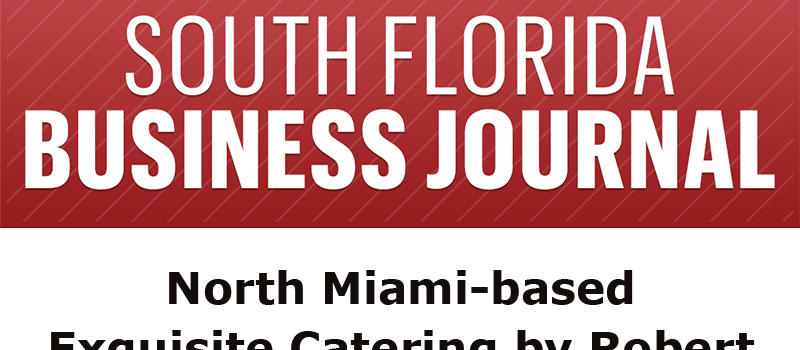
South Florida companies switch gears to boost revenue during Covid-19 pandemic
Toast Distillers founder Dieuveny “DJ” Louis didn’t expect to get into the hand sanitizer game, but now it seems like a natural extension of his growing business.
The Miami-based distillery responded to the overwhelming demand for hand sanitizer in early March, when Covid-19 cases began to skyrocket across the U.S. It was clear there was enormous demand for the product, which sold out at brick-and-mortar stores and online retailers in the early months of the pandemic.
For Louis, expanding his business was an easy decision. After all, Toast had plenty of the product’s main component – alcohol – in stock. Five months later, the distillery is still producing hand sanitizer and doesn’t plan to stop.
“It’s not slowing down at all,” Louis said. “It’s part of our core business now.”
In South Florida, many businesses are exploring new avenues for revenue as Covid-19 disrupts their once-steady income streams. Some, like Toast, pivoted to produce or supply critical goods, while others responded to anticipated consumer changes sparked by the virus.
Business of hand sanitizer
Louis’ entrepreneurial drive was a factor that pushed Toast Distillers toward the production of hand sanitizer.
“I knew if we didn’t do it, a competitor would,” he said, adding that it was clear distilleries would need to step in to fill a massive shortage of the virus-killing product.
The demand for hand sanitizer made it, along with face masks, a new necessity in the age of Covid-19.
Global hand sanitizer sales are expected to exceed $11 billion in 2020, according to an April report from market research firm Arizton. Demand is expected to continue into 2021, as the firm predicts consumers and businesses will still stock up as a precautionary measure. But the market should normalize by 2022.
For Toast, going from vodka to hand sanitizer wasn’t a huge pivot, Louis said. After all, hand sanitizer typically comprises at least 60% alcohol.
Toast launched production in March at its subsidiary, The Miami Distilling Co. The distillery manufactures its signature vodka made with coconut water, as well as branded alcohol for other specialty spirit companies, including Pitbull’s Voli Vodka and Miami Club Rum.
Soon after, it partnered with Cosmetic Corp. of America and Evi Specialty Ingredients, both based in Medley, to manufacture its EZ Hand Sanitizer on a large scale. Louis said his Miami distillery didn’t have the space to produce and bottle sanitizer for the long term.
“We joined forces when we realized this wasn’t going to be a temporary business for us,” Louis said. Miami Distilling Co. supplies the alcohol for production to its partners, which manufacture and distribute the products, he added.
Toast also partnered with Fort Lauderdale-based CBD supplier Veritas Farms to manufacture its own brand of hand sanitizer, carried by retailers such as CVS Pharmacy and Walgreens. The Veritas Farms line is manufactured by the Cosmetics Corp. of America.
So far, the pivot has been profitable for Toast: Hand sanitizer now accounts for about 15% of the company’s revenue, Louis said.
Virus-proof homes
Real estate developers are exploring ways to virus-proof spaces, a trend that isn’t likely to end with Covid-19.
Uni Tower, a mixed-use development planned for Miami, is implementing technology such as UV lighting, which can kill the virus, and thermal cameras to detect temperature as measures to protect tenants from transmission.
Nir Shoshani, founder of N.R. Investments, the developer behind the project, anticipates consumers will seek out spaces with extra protections during and following the pandemic, due to heightened awareness of how viruses spread.
“People are looking for a safe, secure and sustainable environment,” he said. “That’s what landlords will be expected to provide.”
While Shoshani admitted those features could probably draw higher rents, he said he’s not sure that’s justified. Some protective measures, such as UV lights, are relatively inexpensive to purchase and install, and should be prioritized to enhance public safety, he said.
Privacy is another feature in high demand.
John Farina, president and CEO of Philadelphia-based U.S. Construction, said there’s been increased interest in privacy measures by residences at Ocean Delray, a 19-unit boutique building under development in Delray Beach.
The building has 19 private garages, nine private elevators and nine separate lobbies, all designed to limit contact among residents. All of the entrances are operated by fobs, eliminating contact with high-touch points such as elevator buttons and door handles.
That feature has been well-received in the age of social distancing, Farina said. The units, which sell for between $5 million and $9 million, are 50% sold.
“The trend right now is eliminating share points,” he said. “People have more questions about potential contact in entryways or parking areas – the kind of details they don’t usually dig into.”
Rolling with the punches
When Covid-19 hit, offices sent their employees home, business travel froze and convention centers were left empty, with no events to host.
That stripped North Miami-based Exquisite Catering by Robert of most of its clients.
The corporate catering company quickly switched gears to produce premade family dinners, available for delivery. Priced at $60 each (including delivery), the meals are earning just a fraction of what Exquisite Catering usually brings in, but are sufficient to pay the bills and retain staff.
“It’s enough to keep the engine running,” owner Robert Egert said.
To keep prices low, Exquisite Catering took its typical catering menu, designed to feed anywhere from 10 to 100 people, and scaled it down to create a five-person family meal. The service launched in early April, when the company was floating in a sea of event cancellations. The concept initially boomed, but slowed once local restaurants began offering similar meal services to make ends meet.
But delivery, combined with a contract Exquisite Catering received to feed National Guard members and Florida Department of Health workers, has kept the company’s 45 staff members employed full time.
“Every little bit helps and keeps people working, but these contracts could come and go,” Egert said.
Above water
Fort Lauderdale-based Water Taxi, another business that has seen its usual customer base dissipate, also switched gears.
The hop-on, hop-off boat service offers tours of Fort Lauderdale from the city’s waterway, a narrated excursion that usually includes 10 stops. But when the pandemic hit, the company realized it couldn’t shuttle huge groups on its vessels. When tourists stopped coming, CEO Bill Walker knew it was time to brainstorm.
“Everyone was confused and concerned, and we were just bleeding money,” Walker said. “So we decided to move to charters only.”
Knowing that many locals are itching for ways to get out of the house, Water Taxi decided to market private charters for up to 10 people. It focuses on families, small groups of friends, and couples searching for date night options.
It’s not cheap: Small boats are available for $400 for two hours and large boats go for $1,000. But with Covid-19 closures leaving locals with few entertainment options outside of the home, Water Taxi is banking on the hope that cabin fever will drive locals to boating.
“Being outdoors on the water is a safer place to be, and I think people are aware of that,” Walker said. “We’ve had excellent success so far.”
As countless businesses search for pivots to keep their ventures viable, Toast Distillers’ Louis said he knows he’s lucky.
Sales of the company’s signature vodka were minimally affected by bar and nightclub closures, he said. It appears that plenty of consumers continue to drink at home, adding some credence to the notion that alcohol may be a recession-proof commodity.
“When everything else shuts down, people can still enjoy a cocktail at home,” Louis said. “The business of spirits doesn’t stop.”
Coronavirus sparks shift for entrepreneur
Entrepreneurs, like businesses, have had to pivot to ride out the market changes sparked by Covid-19.
Just ask Steven Shulman, CEO of Delray Beach-based tech company Safe Space Scan. His previous company, a digital marketing firm that used online travel sweepstakes to raise funding for nonprofits, came to a standstill in February when the virus effectively suspended the tourism industry.
That’s when he found the opportunity to become a co-owner of Safe Space Scan, which distributes a free-standing temperature scanning device to screen for fever, a common symptom of Covid-19.
The tablet-like device can be placed at the entrance of a building or business to detect whether patrons or employees have elevated temperatures – a feature Shulman figured would be in demand by businesses aiming to safely operate during the pandemic.
How does the device work? It uses a thermal camera to take an accurate temperature in about half a second, and sends email notifications to administrators when it detects an elevated or abnormal reading. It is also equipped with facial recognition technology that can be used to detect whether people entering a space are wearing a face mask.
Does it have applications beyond Covid-19? The scanner has been used in Europe and Asia for years, primarily for its facial recognition technology. That technology could be used for door access control or as a replacement for traditional time clocks, so an employee could clock into work with their face. In the U.S., you mainly see facial technology used to open up cellphones, but it has other applications.
How much is it? $1,700 per scanner.
Who are your clients? Fortune 500 companies, hospitals, hotels. Locally, we’ve supplied scanners to Baptist Health South Florida, University of Miami Medical Center, Four Seasons Miami and the Acqualina Resort in Sunny Isles Beach. We launched the U.S. operation in March, but we’re up to seven-figure sales per week.


